Stilt House, 2019
▣ TYPE: Built demonstrator
▨ CLIENT: Margent Farm
▤ KEY MATERIALS: Accoya footings / Insitu hempcrete
▦ METHODOLOGY: Model Making / 1:1 testing / System design / Post occupancy analysis
▥ COLLABORATORS: David Grandorge / Structure Workshop / Will Stanwix / Arbana Berdynaj / Charlie Tomlinson / Daisy Zha / Dahu Mumagi / Enrico Grimani / Josh Kaile / Laurence Hillier / Marcello Seminara / Oliver Carter / Philomena Reinmuller / Alex Scally / Rebecca Johansson / Ross Ellmore / Tarn Philipp
Stilt House is a radically low carbon, highly flexible space 30m² building. The project was conceived within the parameters of the caravan act, meaning in most contexts it does not require planning permission. The design can be adapted with minimal modification to be situated at multiple sites and hosts multiple programmes including living, working and education. The building is raised from the ground maximising valuable covered external space and creating a vantage point from which to survey the farm. The project was awarded the Architects’ Journal Small Projects Prize for Sustainability in 2020.
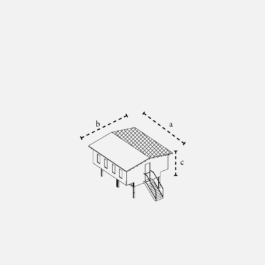
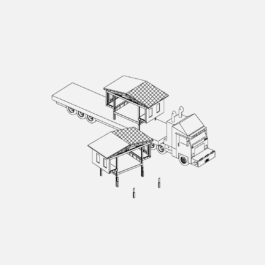
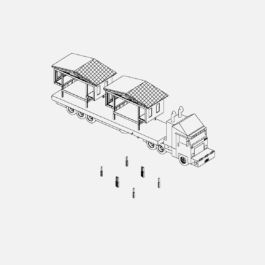
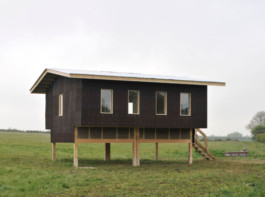
The project was designed by a group of 14 students and built by them in 12 days. It was led by David Grandorge and Paloma Gormley as part of Unit 7 at the London Metropolitan University. Engineering consultancy came from Structure Workshop and a hempcrete workshop run by Will Stanwix. The client, Margent Farm, is an industrial hemp farm developing hemp-based products including the cladding for the building.
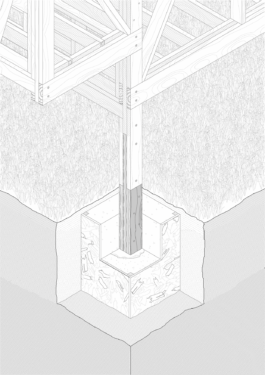
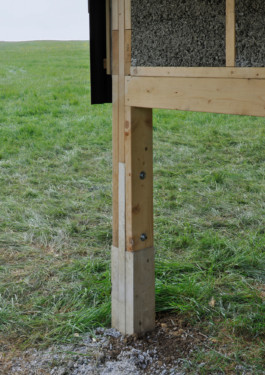
The minimal material palette consists of cast in situ Hempcrete; a spruce stud frame; Accoya acetylated softwood footings, wood fibre insulation and hemp fibre bio-resin corrugated cladding. The windows, door and stair are custom designed and made on site. The building is carbon negative, heated with a biomass stove and solar power and being built predominantly from carbon capturing, grown materials.
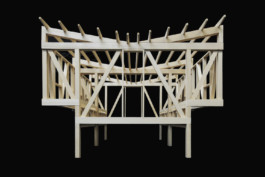
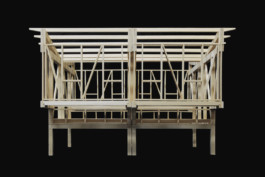
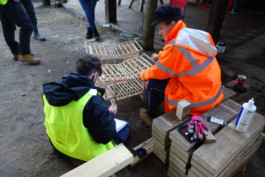
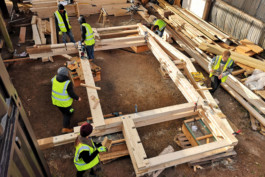


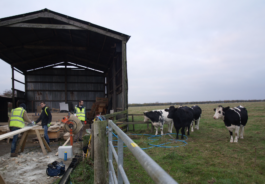
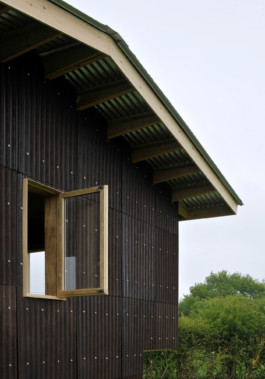
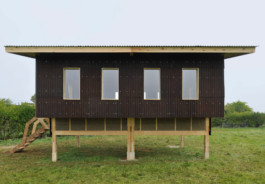
Drawings by Oliver Carter
Photography by David Grandorge and Oskar Proctor
Stilt House, 2019
▣ TYPE: Built demonstrator
⧇ CLIENT: Margent Farm
▤ KEY MATERIALS: Accoya footings / Insitu hempcrete
▦ METHODOLOGY: Model Making / 1:1 testing / System design / Post occupancy analysis
⧆ COLLABORATORS: David Grandorge / Structure Workshop / Will Stanwix
Stilt House is a radically low carbon, highly flexible space 30m² building. The project was conceived within the parameters of the caravan act, meaning in most contexts it does not require planning permission. The design can be adapted with minimal modification to be situated at multiple sites and hosts multiple programmes including living, working and education. The building is raised from the ground maximising valuable covered external space and creating a vantage point from which to survey the farm. The project was awarded the Architects’ Journal Small Projects Prize for Sustainability in 2020.




The project was designed by a group of 14 students and built by them in 12 days. It was led by David Grandorge and Paloma Gormley as part of Unit 7 at the London Metropolitan University. Engineering consultancy came from Structure Workshop and a hempcrete workshop run by Will Stanwix. The client, Margent Farm, is an industrial hemp farm developing hemp-based products including the cladding for the building.


The minimal material palette consists of cast in situ Hempcrete; a spruce stud frame; Accoya acetylated softwood footings, wood fibre insulation and hemp fibre bio-resin corrugated cladding. The windows, door and stair are custom designed and made on site. The building is carbon negative, heated with a biomass stove and solar power and being built predominantly from carbon capturing, grown materials.









Drawings by Oliver Carter
Photography by David Grandorge and Oskar Proctor
BUILD: Arbana Berdynaj, Charlie Tomlinson, Daisy Zha, Dahu Mumagi, Enrico Grimani, Josh Kaile, Laurence Hillier, Marcello Seminara, Oliver Carter, Philomena Reinmuller Alex Scally, Rebecca Johansson, Ross Ellmore and Tarn Philipp
E info@materialcultures.org
T 07707592097
E info@materialcultures.org
T 02030626832